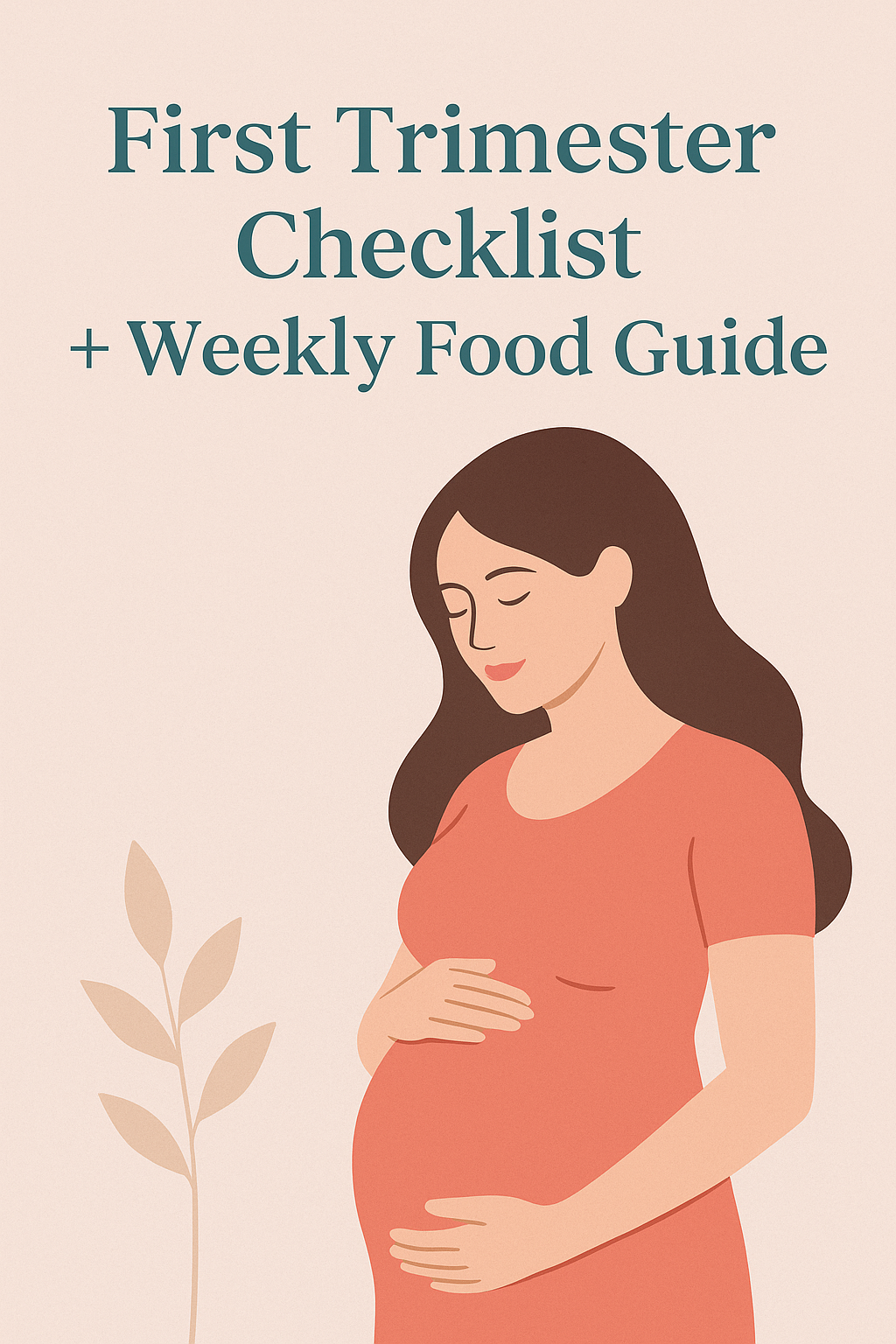By Dr. Akanksha Sharma | MBBS, MD Community Medicine
“I just found out I’m pregnant… now what?”
If that’s the question swirling in your mind, you’re not alone. The first trimester — spanning weeks 1 to 12 — is one of the most exciting yet overwhelming phases of pregnancy. Your body is changing rapidly, and your mind is racing with questions about what’s normal, what to avoid, and how to give your baby the best start.
As a physician and women’s health specialist, I’ve guided hundreds of women through their early pregnancy journeys. Here’s your first-trimester survival guide — a blend of modern medicine, practical wisdom, and compassionate support.
🩺 Understanding the First Trimester: What’s Really Happening?
Your baby may still be the size of a seed, but behind the scenes, incredible things are happening:
-
Fertilisation and implantation
-
Organ formation (by week 10!)
-
Placenta development
-
Rapid hormonal shifts in your body
These changes explain why this trimester often brings morning sickness, mood swings, breast tenderness, and extreme fatigue.
🤢 First Trimester Symptoms: What’s Normal, What’s Not?
Most early pregnancy symptoms are caused by rising hCG, estrogen, and progesterone levels.
✅ Common & Normal Symptoms:
-
Nausea or vomiting (any time of the day)
-
Fatigue and sleepiness
-
Sore breasts
-
Food cravings or aversions
-
Mild bloating and mood swings
🚨 When to Call Your Doctor:
-
Heavy bleeding or severe cramping
-
Fever, chills, or foul-smelling discharge
-
Excessive vomiting (more than 3–4 times a day)
-
No pregnancy symptoms at all (with prior positive test)
🥗 Doctor-Recommended Diet for the First Trimester
The goal is to nourish without overwhelming your digestive system. Here’s what to focus on:
🌟 Top Nutrients You Need:
-
Folate (400–600 mcg/day): Prevents neural tube defects
Sources: Lentils, spinach, avocados, folate-rich supplements -
Iron: Supports increased blood volume
Sources: Green leafy veg, dates, cereals (best to have with vitamin C-rich foods like lemon or amla, to enhance absorption) -
Vitamin B6: Helps reduce nausea
Sources: Bananas, nuts, sweet potatoes -
Omega-3s: Brain & eye development
Sources: Chia seeds, walnuts, algae-based supplements
🚫 Foods to Avoid:
-
Unpasteurized dairy or juices
-
Undercooked meat or eggs
-
Raw sprouts, deli meats
-
Excess caffeine (>200 mg/day)
🚫 Herbal Teas NOT Approved for Pregnancy
| Herb/Tea | Why It’s Unsafe |
|---|---|
| Licorice root | Can raise blood pressure, cause water retention, and affect hormone levels |
| Sage tea | Contains thujone, which may stimulate the uterus and potentially cause miscarriage |
| Parsley tea | Uterine stimulant; large amounts can trigger contractions |
| Pennyroyal tea | Traditionally used to induce menstruation; highly toxic and unsafe in pregnancy |
| Dong quai | May stimulate uterine contractions and increase miscarriage risk |
| Black/blue cohosh | Known to stimulate labor; unsafe in early pregnancy |
| Aloe vera juice/tea | Can irritate the uterus and cause bleeding |
| Ginseng tea | May affect fetal development and hormone levels |
-
Ginger tea – for nausea relief
-
Peppermint tea – soothes digestion
-
Rooibos tea – caffeine-free, antioxidant-rich
-
Chamomile (occasionally) – mild relaxation (avoid in excess or if allergic to daisies)
Tip: Always check with your doctor before drinking herbal teas in pregnancy — even natural herbs can act like medicine in the body.
💊 Supplements You Actually Need
While “eating clean” is important, some nutrients are hard to meet through diet alone, especially during nausea phases.
👩⚕️ Doctor-Recommended Core Supplements:
-
Prenatal multivitamin with methylated folate
-
Vitamin D (2000 IU/day if deficient)
-
Omega-3 DHA (plant-based if vegetarian)
-
Probiotics (help reduce constipation and improve gut health)
Note: Iron is generally not started in the first trimester as it can worsen the nausea!
🧘♀️ Lifestyle Tips for a Healthier You
The first trimester is a time to slow down and tune in. Here’s how to support your body and mind:
💤 Sleep:
Listen to your fatigue — your body is creating life. Nap guilt-free. Sleep ample at night and a short afternoon nap will also help.
🚶♀️ Movement:
Gentle walks, stretching, and prenatal yoga are safe and effective.
😌 Stress Reduction:
Try deep breathing, journaling, gratitude practice, or listening to calming music.
🚫 Avoid:
-
Overexertion
-
Long exposure to the screen blue light at night
-
Harsh beauty products (look for pregnancy-safe skincare)
🚫 Avoid Harsh Beauty Products (Choose Pregnancy-Safe Skincare)
During pregnancy, your skin becomes more sensitive and absorbent, and many common beauty products may contain ingredients that aren’t safe for your growing baby. Some chemicals can penetrate the skin and enter the bloodstream, potentially affecting fetal development, especially in the first trimester when organs are forming.
Here’s what to watch out for:
❌ Skincare Ingredients to Avoid During Pregnancy
| Ingredient | Why It’s Unsafe |
|---|---|
| Retinoids (Retinol, Retin-A) | Linked to birth defects when used in high doses. Avoid all Vitamin A derivatives topically. |
| Salicylic acid (high-dose) | In large amounts (like chemical peels), it can be harmful. Small amounts in face washes may be okay. |
| Hydroquinone | Used for pigmentation; has high absorption rate and is not recommended. |
| Benzoyl peroxide | Some experts allow small amounts, others advise caution — best avoided in early pregnancy. |
| Formaldehyde | Found in nail treatments and hair smoothing products — carcinogenic and toxic. |
| Phthalates & Parabens | Hormone-disrupting chemicals often found in fragrances, lotions, and shampoos. |
| Essential oils (certain ones) | Oils like rosemary, clary sage, and cinnamon can stimulate the uterus — use with caution. |
Look for products that are:
-
Fragrance-free or naturally scented
-
Labeled “pregnancy-safe” or “non-toxic”
-
Made with gentle, natural ingredients like:
-
Aloe vera
-
Rose water
-
Coconut oil or almond oil
-
Hyaluronic acid
-
Niacinamide
-
Vitamin C (low concentration)
-
🧴 Examples of Pregnancy-Safe Routines:
-
Cleanser: Gentle, soap-free face wash
-
Moisturizer: Fragrance-free with shea butter, glycerin, or organic cold-pressed coconut oil (can even to face if not acne prone)
-
Stretch mark oil: Cold-pressed almond, sesame, or coconut oil
-
Sun protection: Mineral-based sunscreen (zinc oxide or titanium dioxide), shade, umbrellas and hats
💡 Doctor Tip:
“If you wouldn’t put it in your mouth, think twice before putting it on your skin — especially in the first 12 weeks.”
Your skin absorbs more than you think. Switching to clean, pregnancy-safe skincare is one of the simplest and most powerful ways to reduce toxic load during pregnancy.
🌿 Ayurvedic Perspective on the First Trimester
In Ayurveda, the first trimester is governed by Kapha dosha — associated with growth, nourishment, and stability.
Ayurvedic Guidelines:
-
Eat warm, soupy, and lightly spiced meals
-
Avoid heavy, fried, or overly pungent foods
-
Apply coconut or sesame oil for a calming effect
-
Use ghee with turmeric in warm milk to support immunity and digestion
🧾 Doctor’s First Trimester Checklist
✅ Confirm pregnancy with scan & blood tests
✅ Start prenatal vitamins
✅ Book your first OB visit (usually around week 8)
✅ Avoid alcohol, tobacco, and unsafe medications
✅ Plan a balanced, nausea-friendly diet
✅ Begin light movement or prenatal yoga
✅ Hydrate consistently (at least 2–2.5L/day)
💬 Final Thoughts: You’re Doing Great, Mama
The first trimester can feel like a rollercoaster — physically, emotionally, and hormonally. But every twinge, every nap, and every adjustment you make is part of the beautiful unfolding of new life.
If you’re navigating this stage and need personalized support, meal plans, or just a calm voice amidst the noise, I’m here for you.
✨ Let your pregnancy begin with grace, balance, and informed choices. You’ve got this!
📥 FREE DOWNLOAD
CLICK HERE to get your🎁 First Trimester Checklist + Weekly Food Guide
🔗 Related Blogs You Might Love
-
[What to Eat in the First Trimester – Doctor-Approved Meal Plan]
-
[Safe Workouts During Pregnancy: Trimester-Wise Guide]
-
[Ayurvedic Practices for a Smooth Pregnancy]

Akanksha Sharma
Dr. Akanksha Sharma, Head Writer and creator of AtoZ of Pregnancy, is dedicated to empowering women, parents, and families through 360-degree knowledge. She and her team provide evidence-based advice to guide families through pregnancy, parenting and beyond.






